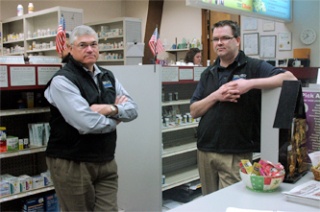ARLINGTON — The owner of Arlington Pharmacy, Dale Duskin, is concerned.
His pharmacy might have to stop serving his Medicaid patients if the state proceeds with cuts to its Medicaid prescription program.
“We just can’t provide the medications at below our cost,” said Duskin, who is a retired pharmacist and owner of Arlington Pharmacy.
“I am very worried that the cuts will limit access to much needed medications for our customers,” Duskin said April 2, a day after the cuts were scheduled to take effect. Tacoma Federal Court Judge Robert J. Bryant issued a temporary restraining order April 1, halting the cuts to pharmacies for 10 days, the maximum delay for a TRO.
The court is now considering an injunction that will halt the cuts indefinitely and a hearing will be held April 9.
Another Arlington pharmacist, John Billdt, of John’s Pharmacy, agrees with Duskin.
“It’s true. The proposed cuts will make reimbursements on some medications below my costs,” Billdt said.
“In some cases generics can provide a viable option, but not all the medications have generics,” Billdt added.
Billdt said that he sent money to the state organizations to help the fight against the cuts.
The Washington State Pharmacy Association and National Association of Chain Drug Stores estimate that the scheduled cuts could force 72 pharmacies serving more than 430,000 Washington patients to choose between losing money and closing their doors.
“Some pharmacies have said they will stop filling prescriptions if no generics are available,” Billdt said.
WSPA, NACDS and the National Community Pharmacists Association filed a joint lawsuit March 30 challenging the Washington State Medicaid program’s plan to cut Medicaid reimbursement to below average wholesale prices minus 20 percent.
“Our business will be fine,” said Duskin, who is just completing an extensive remodel of the building that he developed in the late 1970s.
“But we would not be able to continue serving these customers who need their medications.”
Duskin said that serving the Medicaid patients already takes much more time and effort than the average patient.
“It’s nothing against these people,” he said. “It’s the system that’s the problem.”
The chief executive officer of WSPA, Jeff Rochon said the cuts in reimbursements would result in reduced access to medicine for the state’s most vulnerable patients.
“We’re gratified by this initial win which will temporarily protect our patients while we continue the fight,” Rochon said.
“We are deeply concerned about pharmacists’ ability to continue to provide care to their Medicaid patients,” Rochon said.
Duskin wants his customers to call their elected officials.
“It’s not about our bottom line. It’s about providing patients what they need,” he said.
Duskin’s pharmacist, Chad Crosby sees his role as unique in the field of health care.
“I hear a lot from here,” he said from behind the counter where he spends his days.
“We are some of the most accessible health care professionals,” he said
“Our customers need to harp on elected officials to stop the cuts.”
Duskin said it has been an ongoing battle with Medicaid. He was a member of a Blue Ribbon committee to review the proposed changes in 2003 and he quit because the Medicaid officials were unreasonable.
“They are crappy business people,” Duskin said. “We just can’t be paid below our cost. There is no successful business model that allows it.”
The potential cost to patients and health care over the long term could be devastating, said NACDS President and CEO Steven C. Anderson.
NCPA President and owner of a Seattle pharmacy Holly Henry believes the arguments advanced by pharmacies will carry the day.
“The alternative would limit Medicaid patient access to prescription drugs, therefore endangering their health,” Henry said.
The cuts will add to overall cost of health care as emergency rooms respond to the patients not getting their meds, Duskin said.
“The Pharmacy Benefit Managers are getting rich, while we must eat the losses,” Duskin said.








